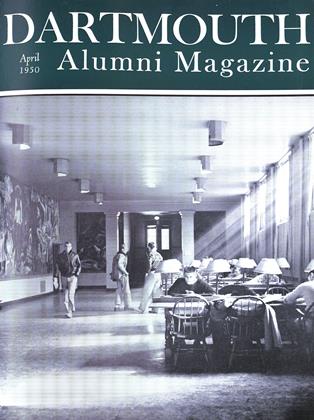On April 1 the Dartmouth Alumni Fund begins its 1950 campaign, seeking to obtain for the College a minimum of $400,000. This objective was set after careful consultation with the officers of the College regarding the budget and after reappraisal of the potentialities of the Fund. The Alumni Fund Committee feels that the goal not only can be achieved, but must be achieved for the continued effectiveness of the College.
The dollar objective is the highest that has ever been set, exceeding last year's actual gifts by $14,000—although smaller than the $417,000 record result in 1946. The Committee is also determined to achieve a new mark in number of contributors, aiming at a figure in excess of 15,000, or 500 more than last year.
In last year's campaign thirty classes fell short of their objectives and it will be the aim of the Committee to assist and encourage those classes to exceed their goals this year. If they do, the total objective will not only be reached but surpassed. Likewise, there were 24 classes which fell below the average participation figure of 80%. Their success this year could easily assure a substantial excess over the desired 15,000 contributors.
The purpose of the Fund will be its historic one of providing free funds which the College can use where needed most. The Committee believes that two major items in the College budget will appeal particularly to all alumni this year—the provision of a substantial increase in the amount of scholarship aid awarded and a modernization and extension of the retirement program.
As living costs have risen over the past ten years, the amount of aid needed by the scholarship boy has mounted also. The College increased its average award during that period but did not give aid to as high a percentage o£ the student body as formerly because of the large number of men receiving help under the G.I. Bill. With the disappearance of the veteran from the campus, the College faces the choice of increasing substantially its scholarship budget or cutting substantially the proportion of men receiving aid. The first choice requires a successful Alumni Fund; the second requires the partial abandonment of a democratic tradition of long standing.
On the second point, the Trustees have long held to the view that the excellence of its faculty is the greatest strength of the College. To maintain that excellence requires a compensation policy that will enable Dartmouth to compete successfully for the services of the best teachers. A proper retirement program is an essential
part of that compensation policy. Until recently there were important segments of the College staff for whom no retirement allowances were available in any form. This situation was remedied by the new plan put into effect last year.
In launching the 1950 campaign, the Alumni Fund Committee of the Alumni Council declared: "Because of the increase in the Fund objective and because of the vital significance to the College of the Fund's success or failure, the Committee is asking that each man review his customary gift and determine thoughtfully and in proportion to what he gives to other causes, what his contribution will be this year. Believing that the freedom and integrity of the College can best be preserved by private support, and likewise believing that the independent college makes a contribution to society as great as that of any other institution, the Committee believes that the Fund deserves a major place in the giving budget of every alumnus."
 View Full Issue
View Full Issue
More From This Issue
-
 Article
ArticleIS TITO COMMUNISM'S LUTHER?
April 1950 By JOHN CLINTON ADAMS, -
 Class Notes
Class Notes1918
April 1950 By ERNEST H. EARLEY, DONALD L. BARR, RICHARD A. HOLTON -
 Article
ArticleTHE COLLEGE
April 1950 By C.E.W. -
 Class Notes
Class Notes1905
April 1950 By ROYAL PARKINSON, GILBERT H. FALL, FLETCHER A. HATCH -
 Class Notes
Class Notes1923
April 1950 By TRUMAN T. METZEL, COLIN C. STEWART 3RD, LEON H. YOUNG JR. -
 Class Notes
Class Notes1929
April 1950 By F. WILLIAM ANDRES, EDWIN C. CHINLUND, GEORGE B. REDDING







